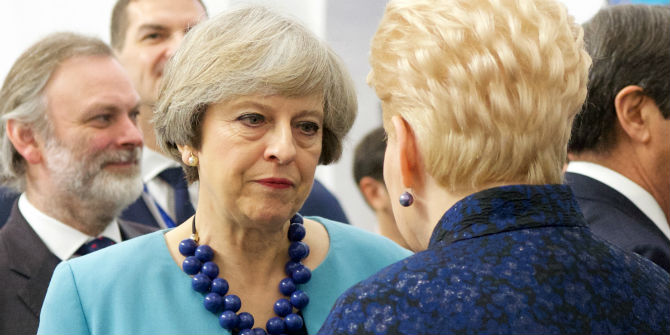 Britain has always been leery of European integration, only seeking to join the EEC when the economic advantages became clear – and then thwarted twice by Charles de Gaulle. As a result, the UK was absent when the founding principles and practices of the Community were drawn up, and absent during the commemoration of the 60th anniversary of the signing of the Treaty of Rome. Julie Smith says these absences have defined our relationship with the rest of the bloc.
Britain has always been leery of European integration, only seeking to join the EEC when the economic advantages became clear – and then thwarted twice by Charles de Gaulle. As a result, the UK was absent when the founding principles and practices of the Community were drawn up, and absent during the commemoration of the 60th anniversary of the signing of the Treaty of Rome. Julie Smith says these absences have defined our relationship with the rest of the bloc.
March 2017
The leaders of 27 states converged on Rome to commemorate 60 years since the signing of the Treaty of Rome, which led to the creation of the European Economic Community (EEC), the precursor of today’s European Union. The prime minister of one member state was missing – Theresa May, preparing to invoke Article 50 of the Lisbon Treaty, the ‘divorce clause’ enabling a country to leave the European Union, on behalf of the UK, decided to stay away.

In the circumstances this was the right decision: the prospect of her attending would have marred such celebrations as the EU was capable of holding, given ongoing problems regarding the Eurozone and migrant crisis. Brexit was just one more problem for the Union to address. Nor was British absenteeism unusual. Look back sixty years or more and the situation looks very familiar.
March 1957
Six European states (France, Germany, Italy and the three Benelux countries) came together to sign two treaties on 25 March 1957, one establishing the EEC, the other an Atomic Energy Community. The continent was deeply divided and many states were excluded from the founding Communities by virtue of being under either right-wing dictatorships or Communist rule. One country had the chance to attend and become a founding member, yet chose not to do so: the United Kingdom. Likewise it had opted to remain outside the very first experiment in European regional integration, the European Coal and Steel Community, established following the visionary Schuman Declaration of May 1950, which sought to make war between European states ‘materially impossible’.
The UK was not wholly opposed to European cooperation, and indeed played a key role in the creation of various intergovernmental fora, including the Western European Union, NATO and the Council of Europe. The decisive difference was that such bodies did not entail any loss of national sovereignty. By contrast, French advocates of integration envisaged the creation of supranational institutions. They did not initially define what they meant – but the UK was unwilling to take the risk of ceding sovereignty and, having emerged victorious from the second world war, did not see the need to do so. Whereas France now recognised its powers were diminished, the UK still saw itself as having a global role: at the centre of Churchill’s three spheres of influence – the emerging Commonwealth, the Anglosphere and Europe.
Having rapidly concluded that the prospect of economic integration was of no greater interest than coal and steel, the UK moved to create the European Free Trade Association (EFTA). As the name implies, the focus of EFTA was on free trade, with no political dimension. Then as now, the UK favoured trade over political integration, cooperation outside the formal integration process. Some politicians did favour membership of the Communities, won over by the same Kantian ideal of creating enduring peace in Europe that inspired the founding fathers. The most notable was Edward Heath, who as Prime Minister would ultimately take the UK into the Community – or ‘Common Market’ as it was widely known in 1973.
It was not the visionary nature of integration that drove the UK’s attempts to join the Common Market in the 1960s, however, but a rather more pragmatic realisation post-Suez that neither the US nor the Commonwealth could be relied upon. Meanwhile, the economic success of the Six was in no way matched by EFTA – which was dominated by the UK, by far its largest member. Yet if the UK under Harold Macmillan had decided to take up the offer in the founding Treaties, namely that ‘any European state may apply to be a member’, it had reckoned without the President of France, Charles de Gaulle, who unilaterally vetoed membership not once but twice – in 1963 in response to Macmillan’s attempts to join and again in 1967 when Labour’s Harold Wilson tried to join the European Club. Only when De Gaulle had lost power in France was the way open for the UK finally to join the Community.
Nonetheless, the way was not entirely simple: De Gaulle’s successor George Pompidou was happy to negotiate entry with Heath, but the Six had already agreed in 1969 that enlargement should be preceded by both ‘completing’ and ‘deepening’ in order to ensure that the UK could not weaken the integration process if and when it finally joined. And so it was that the Community Budget and Common Agricultural and Fisheries Policies, all subsequent targets of British opprobrium, were established before the UK joined the Communities, ensuring that it could not influence them at the outset. So too was economic and monetary union put onto the European agenda before the UK joined, even if the UK ultimately managed to stay outside the Euro. The lesson of the UK’s late entry to the European Communities was the adage les absents ont toujours tort; in the modern vernacular, if you aren’t at the table you are on the menu.
As May begins to negotiate the UK’s departure from the EU, she would do well to remember this lesson.
This post represents the views of the author and not those of the Brexit blog, nor the LSE.
Dr Julie Smith is Director of the European Centre in the POLIS Department and a member of the House of Lords. Her new book, The UK’s Journeys into and out of the EU: Destinations Unknown, was published by Routledge in February.







This reminds us that the younger you are, the less likely you are to remember a UK outside the EU. You have to go back to before January 1973, when the UK joined the EU under the Premiership of Ted Heath.
Being over 60 myself, I can (just) remember those times. While I voted Remain in the referendum myself, a historical perspective as always provides some (but not total) reassurance in challenging times. The UK survived quite well outside the EU before 1973, and could no doubt do so again.
The major difference since 1973 is that Europe (and to a lesser extent the US) is no longer the “centre of the world”. Other countries and regions are on the move. This is shown for example by the G20 replacing the G7 as the key body for inter-state economic co-operation. Economically China is expected to overtake the US in the next 10 to 20 years.
In such times it is indeed tragic, as Donald Tusk said yesterday, to see the countries of Europe pulling apart, rather than coming together.